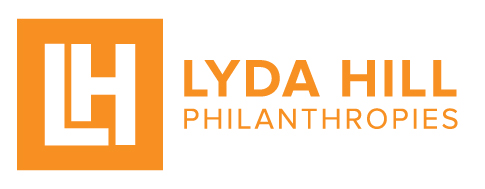The Hill Prizes
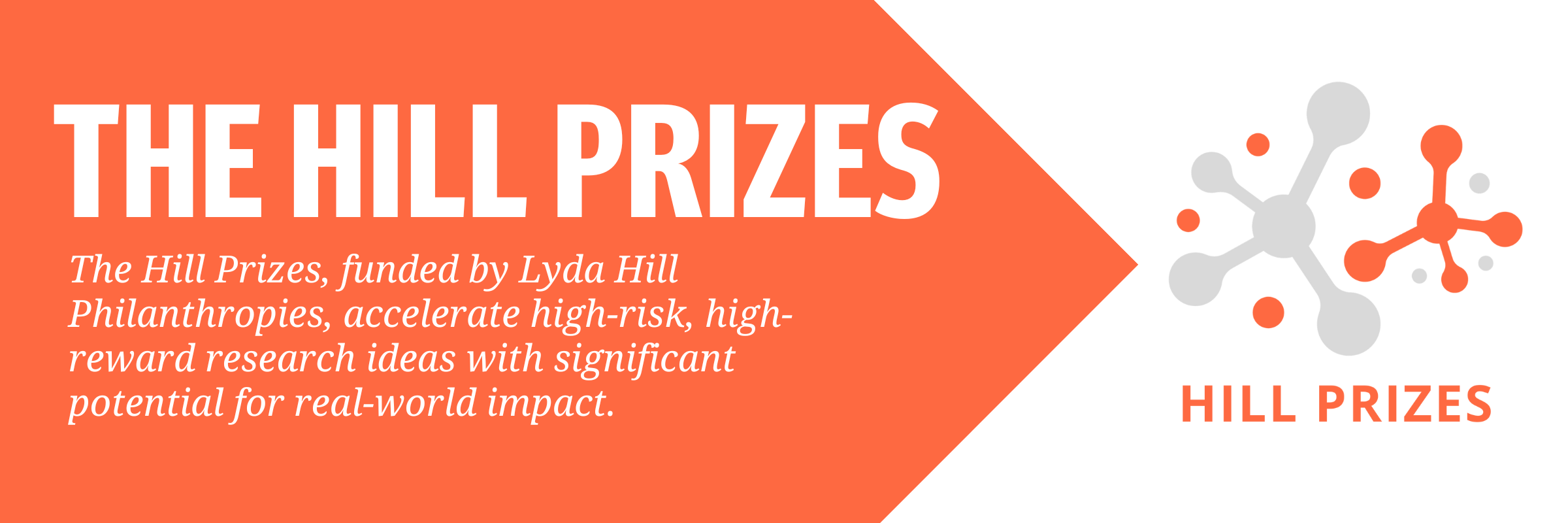
2026 Hill Prizes Information Session
2026 Hill Prizes Call for Applications
Learn more about the prizes, application and selection process below. If you have any questions, please contact TAMEST at tamest@austin.utexas.edu or (512) 471-3823.
The Hill Prizes, funded by Lyda Hill Philanthropies, recognize and advance top Texas innovators and researchers whose work could have significant impact on science and society. The prizes propel high-risk, high-reward ideas and innovations that demonstrate very significant potential for real-world impact and can lead to new, paradigm-shifting paths in research.
The Hill Prizes have six categories: medicine, public health, engineering, biological sciences, physical sciences and technology. The medicine, public health, engineering, biological sciences and physical sciences prizes will be given to researchers and teams at academic and medical institutions. The Hill Prize in Technology will be given to individuals and teams in the private sector and government in applied sciences and engineering.
After an incredibly successful first year of the prizes, Lyda Hill Philanthropies has committed over $10 million in funding to continue the prize program for the next three years. The $10 million will include the addition of a new prize in the category of public health, resulting in six prizes per year of $500,000 each. In addition, at least $1 million in discretionary research funding will be allocated by Lyda Hill Philanthropies on an ad hoc basis to highly ranked applicants and finalists not selected as recipients.
Each prize recipient’s institution or organization will receive $500,000 in direct funding from Lyda Hill Philanthropies to accelerate their work. Prize recipients will be announced in January 2026 and recognized on February 4, 2026, at the opening reception of the TAMEST 2026 Annual Conference in San Antonio, Texas.
The goal of the prizes is to recognize exceptional innovators and provide seed funding to advance innovative science and highlight Texas as a premier destination for world-class research. The prizes will bridge the path from research to business development and further innovations that need additional funding to have a greater impact. The Hill Prizes will also put recipients in a stronger position to receive more research funding and seek large-scale grants and collaborations.
Hill Prizes Overview
Click on a category below to learn more about the Hill Prizes. View the Hill Prizes application guide here.
Who May Apply?
Qualified applicants include all Texas-based researchers who meet the following eligibility requirements:
Medicine, Public Health, Engineering, Biological Sciences and Physical Sciences Eligibility Requirements
- Open to all Texas-based applicants (including TAMEST members) 15 years or more after their first independent (tenured or tenure track) faculty appointment. Applicants must have had 15 years of experience (by calendar year) the year the application is submitted
(must be 2010 or earlier). - Applicants must have spent, at a minimum, the past two years (at the time of submission) performing research in Texas at an institution within the state and stay active there for at least one year after receiving the prize award funding.
- Applications may be submitted by individuals and teams from all research universities, medical centers, nonprofit research institutes and other scientific organizations in Texas.
- Approval by the applicant’s institution is required at the time of the application.
- There may be more than one application from an institution. Collaborative multi- institution applications are welcome.
- For team submissions, the Principal Investigator or team lead must be an active leader and participant of the group and meet all eligibility requirements.
Technology Prize Eligibility Requirements
- Open to all Texas-based researchers (including TAMEST members) 15 years or more after their first full-time private- or government-sector affiliated position. Applicants must have had 15 years of experience (by calendar year) the year the application is submitted (must be 2010 or earlier).
- Applicants must have spent the past two years (at the time of submission) performing research in Texas at a company, government agency or institute within the state and stay active there for at least one year after receiving the prize award funding.
- Applications may be submitted by individuals and teams from all companies, private research institutes, government agencies and other scientific and research organizations in the private sector and government in Texas (including university or government spinout companies).
- Approval by the applicant’s organization is required at the time of the application.
- There may be more than one application from an organization. Collaborative multi-organization applications are welcome.
- For team submissions, the Principal Investigator or team lead must be an active leader and participant of the group and meet all eligibility requirements.
Application Categories
Applicants must choose only one category (medicine, public health, engineering, biological sciences, physical sciences or technology) for their submission and may not submit their proposal in more than one category. Categories are listed in detail on page 7 of the Application Guide. The Hill Prizes Committee reserves the right to move an applicant into a different category if they believe the submission is more suitable for that category. Applicants may only submit one proposal per category.
2026 Hill Prizes Categories
Medicine:
- Autoimmune Disorders
- Cardiopulmonary Diseases
- Clinical Pharmacology
- Gastrointestinal Diseases
- Maternal and Children’s Health
- Musculoskeletal Disorders
- Neuropsychiatric Disorders
- Oncology
- Pathology
- Psychiatry
Public Health:
The public health category is designated for proposals focused on protecting the health of entire populations through science, technology and policy:
- Behavioral Health
- Biostatistics
- Clinical Cancer Prevention
- Community Health
- Disease Control and Prevention
- Epidemiology
- Environmental and Occupational Health
- Health Disparities
- Health Policy and Management
- Health Promotion and Education
- Mental Health
- Nutrition and Food Safety
- Psychology
Engineering:
- Aerospace Engineering
- Biomedical Engineering
- Chemical Engineering
- Civil, Architectural & Environmental Engineering
- Electrical & Computer Engineering
- Electronics, Communications, Information Systems, and Control Systems
- Materials Engineering
- Mechanical Engineering
- Petroleum & Geosystems Engineering
- Industrial and Manufacturing Engineering
Biological Sciences:
- Animal Biology
- Plant Biology
- Microbiology
- Ecology and Environmental Science
- Entomology
- Infectious Diseases and Immunology
Physical Sciences:
- Astronomy
- Chemistry
- Computer Science
- Earth Sciences
- Mathematics
- Physics
- Solar and Space Physics
Technology:
There is no limitation to field or discipline, but the Principal Investigator of the application must come from the private sector or government.
Selection Criteria and Process
A committee of TAMEST members (Texas-based members of the National Academies) evaluates applicants and recommend recipients, in consultation with a panel of National Academies members from outside of Texas. A committee of Texas Nobel and Breakthrough Laureates reviews and endorses the finalists. The TAMEST Board of Directors then gives final approval of the prize recipients. Submissions will be judged on the following criteria:
- Uniqueness of idea behind the research;
- Potential for commercial application and/or real-world impact;
- Strengths of research group leader and/or team;
- Ability and availability of key personnel and infrastructure to execute the work and achieve success with the prize funding to be awarded.
Key Dates, Award Period and Budget
Key Dates:
April 15, 2025: Hill Prizes Information Session
May 1, 2025: Applications Open
May 31, 2025: Applications Close at 6:00 p.m. Central Time
January 2026: Recipients Announced
February 2, 2026: Recipients Recognized at the TAMEST Annual Conference
Award Period:
Proposals should be for at least one year in duration with an expected start date in March 2026.
Budget:
$500,000 USD per prize. Funds may not be used for overhead or indirect charges.
Required Application Materials
Application materials are crucial to evaluating and selecting from the submissions. All applications must be submitted through the online portal and acknowledge approval by the applicant’s institution or organization to accept the prize funds. The following components are required to be submitted as one .pdf document. Applicants will also need to separately upload a copy of their cover page.
1.) Cover page with applicant and proposal information, including:
- Category of prize;
- Title of proposal;
- A summary statement from the applicant (50 words or less) succinctly explaining:
- A summary of the research and why it should be chosen for the Hill Prizes;
- the potential impact of the research.
- An abstract summary (no more than 250 words) of the proposal.
- Applicant information, including:
- Principal Investigator’s name;
- Principal Investigator’s title and organization
- Principal Investigator’s address, email and telephone contact information;
- Principal Investigator’s year of first full-time appointment (must be 2010 or earlier);
- Names of Co-PIs and team members.
2.) A statement from the applicant (up to 5 pages) defining:
- The problem the applicant is trying to solve with their research, and the key gap the work will fill;
- limitations of current approaches and what makes the applicant’s approach novel;
- the potential impact of the work, supported by relevant metrics if possible;
- any potential commercial and translational applications of the work;
- the path to impact for their proposal;
- how the recipient would use Hill Prizes funding to accelerate their work and make a significant impact on society. (Detailed budgets are not required, but applicants should explain how the funding would be used, e.g., for equipment, personnel or other expenses, with approximate amounts for each major category.)
3.) Biographical summary for the Principal Investigator (not to exceed three pages), including:
- a summary of education, employment, honors, recognitions and awards;
- a summary of the applicant’s research interests and activities, including (where applicable) information on the most relevant grant support (titles, sources and duration) or projects led, and the role of the applicant in each grant;
- citations for up to ten of the applicant’s most important research publications;
- a synopsis of the applicant’s discoveries and research contributions; and
- statistics on papers, books, patents (if applicable) and reports.
Applicants may submit NIH or NSF Biosketches for the Principal Investigator in lieu of the biographical summary. Additional team members bios may also be submitted, but the team member bios are not to exceed one page per team member.
Applicants may also submit citations and key references as an additional element of their proposal, but they must be included last and submitted as part of the single .pdf proposal. The review committee will not be evaluating proposals based on citations and extensive literature review, but a few key references are welcome.
All materials (including cover page, statement, biographies and additional references and citations) must be submitted in one .pdf document. Applicants will also need to separately upload a copy of their cover page.
Proposals should be formatted in Times New Roman, 11-point font with margins of at least 0.5”.
Detailed budgets are not required, but applicants should explain how the funding would be used, e.g., for equipment, personnel or other expenses, with approximate amounts for each major category.
Letters of recommendation or support are not permitted and will not be accepted.
Deadline for Submission of Application Materials
All applications must be received by 6:00 p.m. Central Time on May 31, 2025. Applications require a Submittable account to submit, so please create an account early.
Prize Funding Requirements
Each prize recipient’s institution or organization will receive $500,000 in direct funding from Lyda Hill Philanthropies. Recipients retain full intellectual property rights. Expenditures from the prize award must follow the spending policies of the recipient’s institution or organization. Funds may not be used for institutional overhead or indirect charges.
Prize recipients must be from a Texas institution or organization and stay active there for at least one year after receiving the prize funding. Prize funding shall remain with the institution or organization that receives the award. There is no specific requirement for how rapidly the funds must be expended, but the expectation is that the funds will be expended in a timely manner to advance the objectives of the work as quickly as reasonably possible.
Recipients must be able to attend the prize ceremony the evening of February 2, 2026, at the opening reception of the TAMEST 2026 Annual Conference in San Antonio, Texas. Travel and lodging will be provided for Principal Investigators to attend the ceremony.
Recipients must provide a statement on the impact of the funding on their work annually until one year after the prize funds have been expended, with a brief explanation on how the funding was used. Recipients agree that information included in the statement may be used publicly by TAMEST and Lyda Hill Philanthropies. The expectation is that the promotion of successful prize work may be helpful to the prize recipients and to other Texas-based researchers and innovators.
Contact TAMEST
For additional information, please contact TAMEST: tamest@austin.utexas.edu or (512) 471-3823.
2025 Hill Prizes Recipients
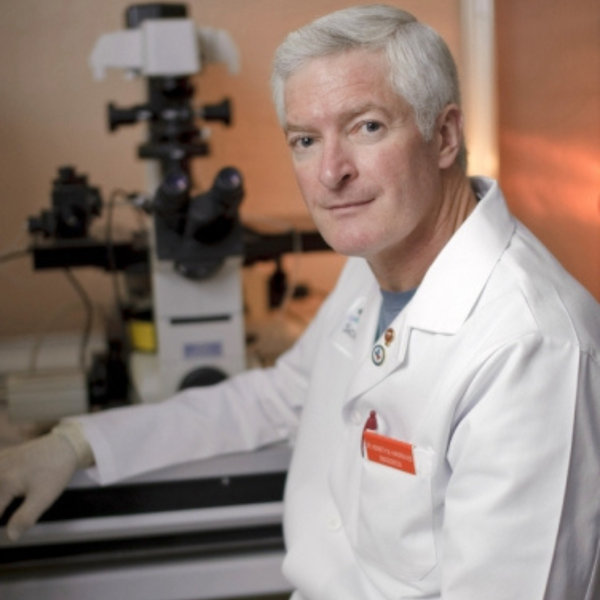
2025 Hill Prize in Medicine
Kenneth M. Hargreaves, D.D.S., Ph.D.
Professor of Endodontics, Pharmacology, Physiology and Surgery
President’s Council Endowed Chair in Research
The University of Texas Health Science Center at San Antonio
For developing non-opioid analgesics, also known as painkillers, to reduce the use of opioids and prevent drug addiction.

2025 Hill Prize in Public Health
Peter J. Hotez, M.D., Ph.D. (NAM)
Dean of the National School of Tropical Medicine
Professor of the Departments of Pediatrics, Molecular Virology & Microbiology
Co-Director of the Texas Children’s Center for Vaccine Development
Baylor College of Medicine
For creating a critical response to escalating health risks intensified by climate disasters through The Texas Virosphere Project.
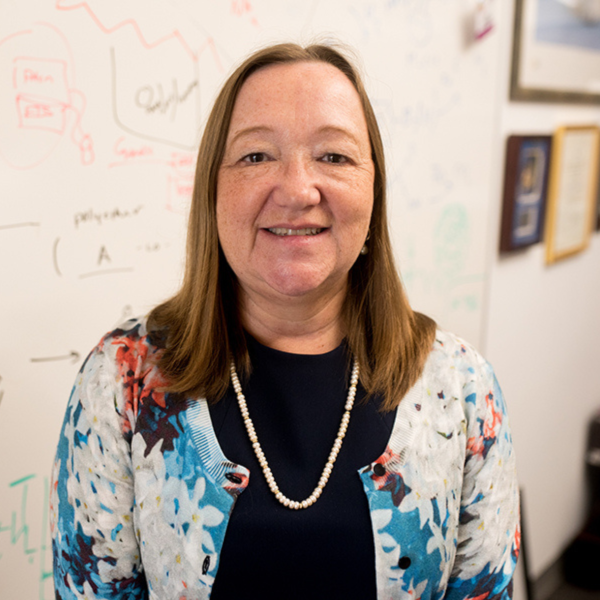
2025 Hill Prize in Engineering
Joan Frances Brennecke, Ph.D. (NAE)
Cockrell Family Chair in Engineering #16
McKetta Department of Chemical Engineering
The University of Texas at Austin
To develop advanced, stable and energy-efficient membrane technology to separate olefins (such as ethylene and propylene) from paraffins, a process crucial in many industries including petrochemicals.
Co-PI: Benny D. Freeman, Ph.D. (NAE), William J. (Bill) Murray, Jr. Endowed Chair in Engineering, The University of Texas at Austin
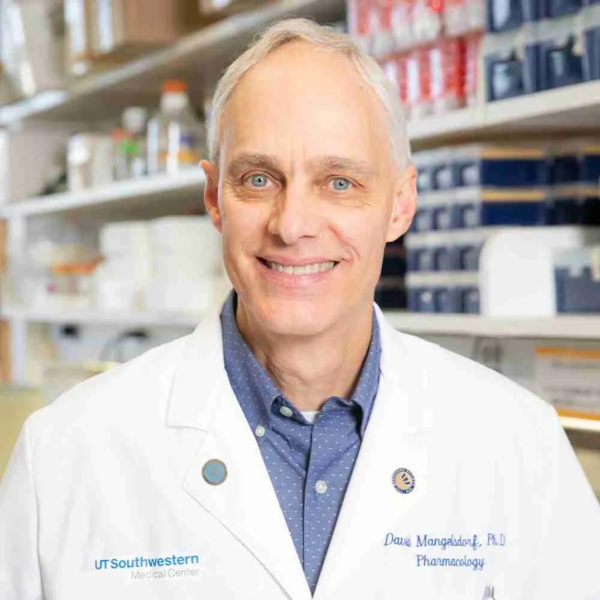
2025 Hill Prize in Biological Sciences
David J. Mangelsdorf, Ph.D. (NAM, NAS)*
Professor and Chair
Department of Pharmacology
UT Southwestern Medical Center
Investigator
Howard Hughes Medical Institute
For exploring a novel vulnerability in the signaling pathway that governs soybean cyst nematode (SCN) infection in soybeans.
Co-PI: Steven A. Kliewer, Ph.D. (NAS), Professor of Molecular Biology and Diana K. and Richard C. Strauss Distinguished Chair in Developmental Biology, UT Southwestern Medical Center
*Dr. Mangelsdorf is a past recipient of the Edith and Peter O’Donnell Award in Medicine (2007).

2025 Hill Prize in Physical Sciences
James Chelikowsky, Ph.D.
Professor of Physics
Professor of Chemical Engineering
W.A. “Tex” Moncrief, Jr., Chair in Computational Materials
Oden Institute for Computational Engineering and Sciences
The University of Texas at Austin
For its innovative approach to designing and discovering permanent magnets that do not rely on rare-earth materials.
Co-PI: J. Ping Liu, Ph.D., Distinguished University Professor, Physics, The University of Texas at Arlington
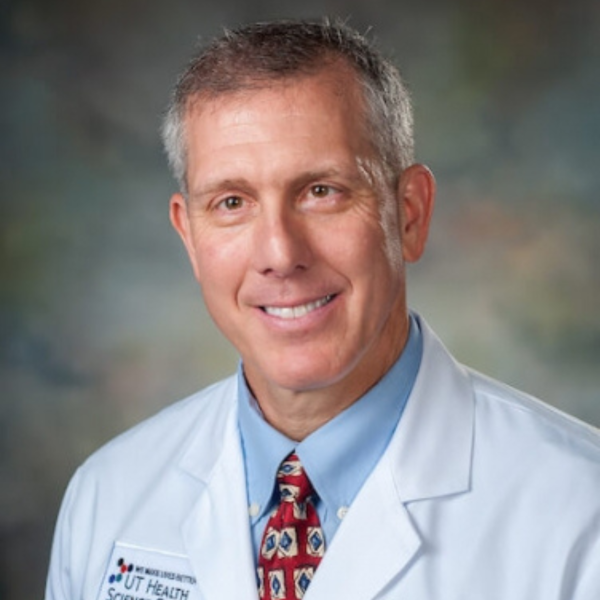
2025 Hill Prize in Technology
Robert De Lorenzo, M.D.
President and Co-Founder
EmergenceMed LLC
For addressing longstanding issues in airway management for emergency, critical care and surgical settings.
Co-PI: R. Lyle Hood, Ph.D., Associate Professor, Mechanical Engineering, The University of Texas at San Antonio
Meet Our Committee

David E. Daniel, Ph.D. (NAE)
Hill Prizes Committee Chair
President Emeritus, The University of Texas at Dallas
Past President, TAMEST
Medicine
- Subcommittee Chair: Malcolm K. Brenner, M.D., Ph.D. (NAM), Baylor College of Medicine
- Gerard E. Francisco, M.D. (NAM), The University of Texas Health Science Center at Houston
- George A. Macones, M.D. (NAM), The University of Texas at Austin Dell Medical School
- Catherine Y. Spong, M.D. (NAM), UT Southwestern Medical Center
Public Health
- Subcommittee Chair: Ellen R. Gritz, Ph.D. (NAM), The University of Texas MD Anderson Cancer Center
- Carlos Roberto Jaén, M.D., Ph.D. (NAM), UT Health San Antonio
- Charles B. Nemeroff, M.D., Ph.D. (NAM), The University of Texas at Austin Dell Medical School
- William M. Sage, M.D., J.D. (NAM), Texas A&M University
Engineering
- Subcommittee Chair: Linda Katehi, Ph.D. (NAE), Texas A&M University
- David T. Allen, Ph.D. (NAE), The University of Texas at Austin
- John L. Junkins, Ph.D. (NAE), Texas A&M University
- Lydia E. Kavraki, Ph.D. (NAM), Rice University
Biological Sciences
- Subcommittee Chair: David W. Russell, Ph.D. (NAS), UT Southwestern Medical Center
- Richard A. Dixon D. Phil, D.Sc. (NAS, FRS), University of North Texas
- Guillermina “Gigi” Lozano, Ph.D. (NAM, NAS), The University of Texas MD Anderson Cancer Center
- Huda Y. Zoghbi, M.D. (NAM, NAS), Baylor College of Medicine
Physical Sciences
- Subcommittee Chair: William H. Press, Ph.D. (NAS), The University of Texas at Austin
- Paul C.W. Chu, Ph.D. (NAS), University of Houston
- David R. Nygren, Ph.D. (NAS), The University of Texas at Arlington
- Peter G. Wolynes, Ph.D. (NAS), Rice University
Technology
- Subcommittee Chair: Joseph B. Powell, Ph.D. (NAE), University of Houston
- Lynda Chin, M.D. (NAM), Apricity Health
- Bob Metcalfe, Ph.D. (NAE), The University of Texas at Austin
- James J. Truchard, Ph.D. (NAE), National Instruments
Nobel and Breakthrough Laureates Committee
James P. Allison, Ph.D. (NAM, NAS)
Chair, Department of Immunology and Executive Director, Immunotherapy Platform
Deputy Director, David H. Koch Center for Applied Research of Genitourinary Cancers
The University of Texas MD Anderson Cancer Center
Nobel Prize in Physiology or Medicine, 2018
Bruce A. Beutler, M.D. (NAM, NAS)
Regental Professor
Director of the Center for Genetics of Host Defense
UT Southwestern Medical Center
Nobel Prize in Physiology or Medicine, 2011
Michael S. Brown, M.D. (NAM, NAS)
Paul J. Thomas Professor of Molecular Genetics
Director of the Jonsson Center for Molecular Genetics
UT Southwestern Medical Center
Nobel Prize in Physiology or Medicine, 1985
Zhijian “James” Chen, Ph.D. (NAM, NAS)
Howard Hughes Medical Institute
George L. MacGregor Distinguished Chair in Biomedical Science
Professor, Department of Molecular Biology
UT Southwestern Medical Center
Breakthrough Prize in Life Sciences, 2019
Regental Professor Virginia and Edward Linthicum Distinguished Chair in Biomolecular Science
UT Southwestern Medical Center
Nobel Prize in Chemistry, 1988
Joseph L. Goldstein, M.D. (NAM, NAS)
Chairman of the Department of Molecular Genetics
UT Southwestern Medical Center
Nobel Prize in Physiology or Medicine, 1985
Helen H. Hobbs, M.D. (NAM, NAS)
Director, Eugene McDermott Center for Growth and Development; Professor of Internal Medicine and Molecular Genetics
Howard Hughes Investigator
UT Southwestern Medical Center
Breakthrough Prize in Life Sciences, 2015
Huda Y. Zoghbi, M.D. (NAM, NAS)
Distinguished Service Professor, Department of Molecular and Human Genetics
Director, Jan and Dan Duncan Neurological Research Institute
Investigator, Howard Hughes Medical Institute
Baylor College of Medicine
Breakthrough Prize in Life Sciences, 2017
Funders
About Lyda Hill Philanthropies
Lyda Hill Philanthropies encompasses the charitable giving for founder Lyda Hill and includes her foundation and personal philanthropy. Her organization is committed to funding transformational advances in science and nature, empowering nonprofit organizations and improving the Texas and Colorado communities. Because Miss Hill has a fervent belief that “science is the answer” to many of life’s most challenging issues, she has chosen to donate the entirety of her estate to philanthropy and scientific research. For more details, visit lydahillphilanthropies.org.


